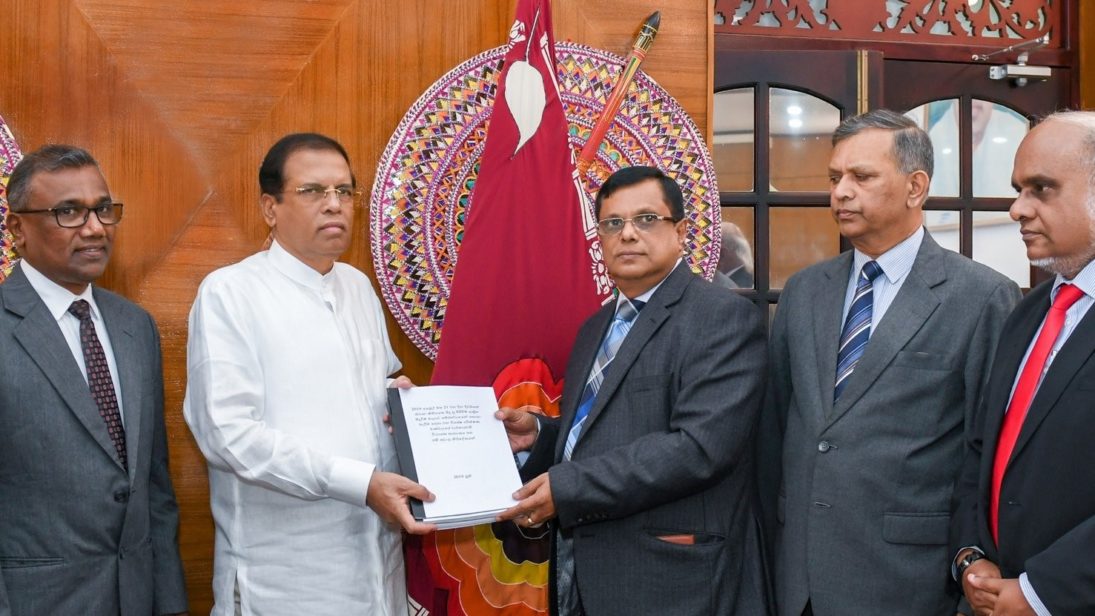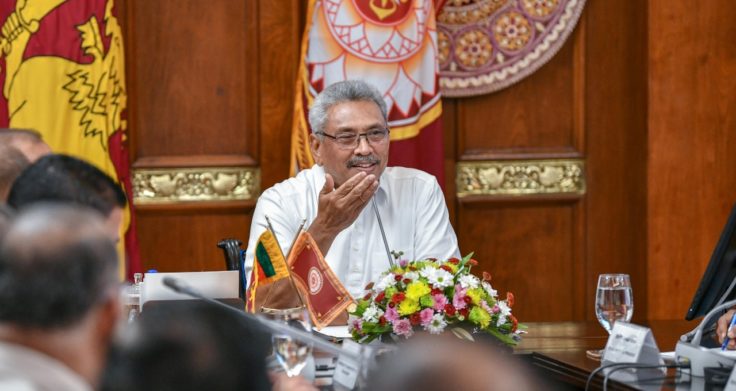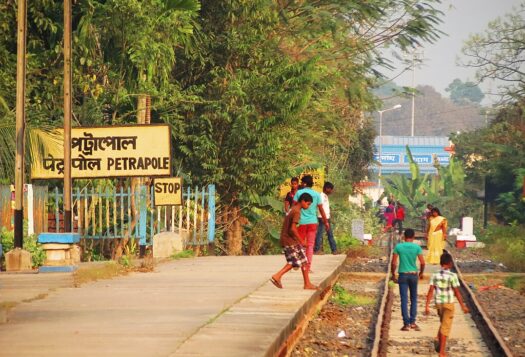
For Sri Lanka in 2019, repercussions from the 2018 constitutional crisis after the President Maithripala Sirisena attempted to replace Prime Minster Ranil Wickremesinghe, framed the year’s political, social, and economic developments. Two distinct events dominated the narrative for the year: the Easter Sunday terrorist attack and the November election of Gotabaya Rajapaksa as President. Both could be traced to internal disagreements between coalition partners during the previous Sirisena-Wickremesinghe government. The revelation that internal divisions contributed to security lapses leading up to the Easter Sunday attacks led to deepening mistrust of a government already unpopular for constant policy instability and low economic growth.
President Gotabaya Rajapaksa’s election and his party’s—the Sri Lanka Podujana Peramuna (SLPP)—predicted victory in the 2020 parliamentary elections are likely to provide much needed policy consistency that could provide a shift away from election focused policymaking. However, populist election-focused economic policies such as a wide reduction in taxes affecting the budget deficit may lead to future economic uncertainty given Sri Lanka’s high debt-service obligations during the next three years. Looking ahead, therefore, the new year may be used as a gauge to determine if the new administration can deliver on its promises of a different style of political leadership and whether general popularity translates to sustainable economic policies.
Easter Sunday Terrorist Attacks
On April 21, the relative peace Sri Lanka had enjoyed since the conclusion of the near three-decade long conflict in 2009 ended with a series of coordinated terrorist attacks on churches and hotels in and around Colombo. The attacks left 290 dead and more than 500 injured. Subsequent investigations revealed significant lapses in intelligence and coordination as senior officials reportedly received information about possible attacks as early as April 4, 2019—17 days before the bombing.
The Easter bombings created deep insecurities among the Sri Lankan populace following ten years of relative peace, and heightened political discourse around national security concerns.
The incident also revealed the extent of the political fallout between then President Sirisena and Prime Minister Wickremasinghe, as the Prime Minister revealed that he had not been invited to Security Council meetings since the constitutional crisis in October 2018 and that neither he nor his Cabinet of Ministers were alerted of the intelligence. The political hostility between the two leaders deepened during the aftermath of the attacks as parallel investigations were conducted through a Presidential Commission and a Parliamentary Investigative Committee—with the President barring defense and intelligence officials from testifying in the investigation. While the Presidential Committee laid the blame almost exclusively on intelligence officials, the Parliamentary Committee noted that in the lead up to the attack, in-fighting between the President and Prime Minister contributed to severe security lapses. Notably, the parliamentary investigative committee report on the matter found no direct link between the terrorists and Islamic State, which had been reported during the immediate aftermath of the attack.
Further, sectarian tensions in Sri Lanka heightened following the attack. Between May 12 and 13, amidst a state of emergency, extremist mobs initiated riots and attacks against Muslim households and shops in parts of the country such as Kurunegala, capital of Sri Lanka’s North Western Province, and spearheaded a national campaign to boycott Muslim businesses. The unchecked elevation of majoritarian, nationalist political elements during this time led to a further severe erosion of stability and trust in the state. Overall, the Easter bombings created deep insecurities among the Sri Lankan populace following ten years of relative peace, and heightened political discourse around national security concerns.
Rajapaksa Back in Power
The second half of the year was influenced primarily by Presidential politics as the Easter Sunday attack, sluggish economic growth, and internal political divisions heightened anti-incumbency sentiment. President Gotabaya Rajapaksa’s victory with 52.25 percent of the vote, almost exclusively driven by the Sinhala-Buddhist majority electorate, also ushered in the official return of former President Mahinda Rajapaksa—Gotabaya Rajapaksa’s brother—as the country’s Prime Minister. The results also highlighted the deep distrust among minority voters about past actions of the previous Rajapaksa administration, including the current President during his time as Secretary of Defence. The administration faced serious allegations of war crimes, authoritarianism, and nepotism during the Rajapaksa’s previous reign from 2005 to 2015. Currently, the President is leading a minority interim with a parliament that was prorogued from early December until January 3. The President is expected to dissolve parliament and call for general elections in early March as soon as he is constitutionally empowered to do so.

Economic Stagnation
Despite gains in macroeconomic reform measures in fiscal, monetary, and exchange rate policy since mid-2016, Sri Lanka’s economic growth remains sluggish, resting at under 3.5 percent. The erosion of investment confidence following the constitutional crisis during the last quarter of 2018 worsened with the Easter Sunday attacks and subsequent riots. Following the attacks, the Sri Lankan economy effectively came to a standstill, with second quarter growth a mere 1.6 percent. The tourism sector was hit particularly hard with tourist arrivals in May falling by 70.8 percent compared to 2018. The sector is now experiencing a gradual recovery, with tourist arrivals in October only less than 22.5 percent of the previous year. The economic blow to the tourist industry unfortunately came in the same year Lonely Planet ranked Sri Lanka the top country to visit in 2019.
Since his election, President Rajapaksa has implemented an expansionary fiscal policy by reducing taxes worth approximately USD $3.1 billion in government revenue in the hopes of stimulating consumer spending and private investment. Although the exact impact of these tax cuts on growth is still unclear, ratings agencies have warned that these measures are likely to increase the country’s deficit. Facing a debt that hit 82.9 percent of the country’s GDP in 2018, Sri Lanka will need to reduce public investments and unnecessary public expenditure to mitigate negative impacts of the tax cuts. Given the impact of a sluggish economy in the last administration’s unpopularity, the new administration’s success or failure in bolstering economic growth will likely be a key variable in maintaining support.
Given the impact of a sluggish economy in the last administration’s unpopularity, the new administration’s success or failure in bolstering economic growth will likely be a key variable in maintaining support.
Looking Ahead to 2020
The first quarter of 2020 will undoubtedly be defined by the impending parliamentary elections, expected to take place in April. The President’s political party (the SLPP), is expected to gain a sizeable majority. If the SLPP can gain a two-thirds majority, the party will be able to oversee constitutional changes, such as repealing the nineteenth amendment (which significantly limited the powers of the President). The lead up to the election will also be influenced by internal dynamics within the United National Party (UNP), with Presidential candidate Sajith Premadasa repeatedly calling for Wickremesinghe to step down from party leadership.
Furthermore, some commentators are concerned that the democratic space for dissent and media freedoms is shrinking under the current government. Reports of alleged physical attacks on three media personnel, questioning of two web journalists, and the recent allocation of the National Media Centre and the National NGO Secretariat under the purview of the Ministry of Defence have increased fears of a potential crackdown against political dissenters.
On the foreign policy front, President Rajapaksa has called for a non-aligned stance, especially on regional geopolitics between India and China. The administration recognizes the economic and political value of relations with both India and China and thus appears keen to engage with both on an equal platform rather than align with the China, as it did during President Mahinda Rajapaksa’s administration. In the immediate future, it is likely that the government will focus on broadening its foreign policy with a view towards improving economic interconnectivity.
In the short term, the new government’s primary challenge will be to stimulate economic growth without disrupting its debt repayment measures. Given the impending general elections, the government will likely be enticed to pursue popular economic policies to garner electoral support. However, such policies may be detrimental to the country in the medium and long-term. Alongside these measures, the government will be required to focus on expanding the nation’s export sector. However, this sector will have to guard against the potential negative impacts of losing preferential access to the European Union market through the Generalized Scheme of Preferences (GSP+) program, which reduces tariffs for certain low and lower-middle income countries. Now that Sri Lanka has graduated to upper-middle income status it may be phased out of the program in the coming years. Sri Lanka may also have to mitigate other external shocks such as a potential economic downturn in the UK (one of Sri Lanka’s primary export markets) following Brexit.
Conclusion
Looking ahead to 2020, political instability is likely to subside in the wake of parliamentary elections, and if a clear policy vision by the government is made available to domestic and foreign investors. Economic uncertainty, however, is likely to remain in the coming year as the government balances a debt burden with a fragile economy. Similarly, the outcome of the parliamentary election will determine whether the government is able to adapt constitutional reforms and other measures that may alter the democratic space of the country. The new year, therefore, will distinguish whether President Gotabaya Rajapaksa’s election leads to the new technocratic governance that he promised or if it is effectively a return to Rajapaksa politics that dominated the first half of the decade.
Views expressed here are the author’s own and should not be attributed to any organization or institute with which he is affiliated.
Editor’s Note: SAV contributors from across the subcontinent recap the most significant political, economic, and strategic developments in South Asia in 2019 and analyze what opportunities and challenges lie ahead for each country in 2020. Read the full series here.
***
Image 1: Government of Sri Lanka via Twitter
Image 2: Government of Sri Lanka via Twitter


